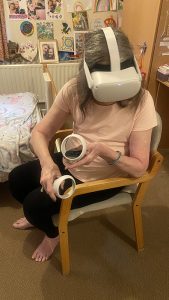I feel when I didn’t get the answer I wanted, I started to panic inside
As I’m talking about loneliness when my feedback is that elderly living in care homes have their own way to release loneliness. VR’s short experience can’t test his effectiveness in the long run, and I want to change the subject.
But perhaps I shouldn’t focus on whether the results are successful but on the process
So I changed the subject again. How can immersive experiences play a positive role in diminishing loneliness in elderly residents living in care homes?
To make my project clearer, I try to answer David’s questions
- Who is your (true) target audience/s?
The person who works in the field of old age, pension institution, a company or individual that develops products for the elderly
- Where are they from/how old are they/what gender are they?
Aging institutions, VR Software development company
- What do you know about them?
They try to provide better service to the old people
- Why should they care about your project?
My project has reflected the relatively real feedback of the elderly, but also to understand the real situation of the nursing home in the operation of VR
- What could your project do for them?
Have a positive impact on their mental state in nursing homes
- Did you ask your target audiences or stakeholders about their needs/issues/challenges?
There are interviews for loneliness, everyone’s needs are different, but they all hope that their family members can visit frequently.
- What will encourage them engage?
Experience new things and connect with other people or the outside world
- What authenticity and authorship do you bring to your research?
- How many people did you engage with and how did you engage with them?
More than 10 people including the elderly living in a care home and stuff of care home.
Face-to-face doing activities.
- What evidence did you use to test your idea and get that result – if yes then ‘how’, ’why’, if not then ‘why not’?
Compare the feedback of the elderly after virtual reality and real-world activities. But it’s difficult to measure emotions.
- What will your intervention look like?
Activities. Virtual traveling and Creative activities.
- What will your intervention measure?
- What will your intervention hope to discover?
- How did you arrive at your method/process of testing/intervention and what (research/expertise/insights) informed your thinking?
- If you tested other methods what was the result and what did you learn?
- How did you use what you learned to improve your question/proposition/research understanding?
- What areas of theory did you use to inform your understanding?
- What areas of theory/expertise are applicable to your research – (examples, behavioural economics, marketing, anthropology, sociology, etc)?
- How did you apply theory to your understanding and what did you learn/discover?
- How did you document your process and how did each member (expert/stakeholder/target audience) contribute their voice/ideas/understanding to your research?
- How will you present what you have learned?
- How will what you’ve discovered evolve/develop your question?

